Showing 1-10 of 36 results
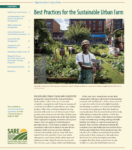
Best Practices for the Sustainable Urban Farm
For decades, urban farms and community gardens have helped meet the demand for fresh, local produce. Urban farms are diverse and adaptable, ranging from small farms on repurposed vacant lots to multilevel vertical farms and rooftop gardens. Often, they combine ecological farming practices with some form of infrastructure. Urban growers make clever use of their […]
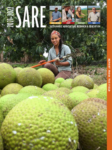
2021–2022 Report from the Field
Report from the Field features 12 stories from around the country of recent SARE grantees who are finding new ways to improve the sustainability of U.S. agriculture. The report also summarizes our total investment in research and education projects since 1988.
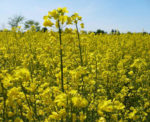
Sustainable Production and Use of On-Farm Energy
Using solar or wind energy or producing biofuels from crop feedstocks and anaerobic digestion helps farmers achieve energy independence while improving profitability and reducing fossil fuel emissions.
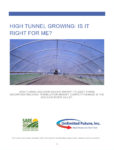
High Tunnel Growing: Is it Right for Me?
A report to assist farms incorporating high tunnels for market competitiveness, with research from West Virginia's Mid-Ohio River Valley.
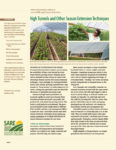
High Tunnels and Other Season Extension Techniques
From low covers to high tunnels, from hoop houses to greenhouses—producers are finding ever more innovative ways to extend the growing season, and their income stream.
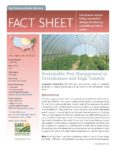
Sustainable Pest Management in Greenhouses and High Tunnels
From 2007 to 2009, Cornell researchers in New York used a SARE grant to study the efficacy of biological insect control in minimally heated greenhouses and high tunnels or hoop houses. This fact sheet reports the results and provides detailed advice on how growers can use natural enemies to manage insect pests in minimally heated greenhouses and unheated high tunnels.
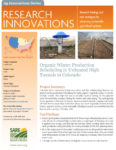
Organic Winter Production Scheduling in Unheated High Tunnels in Colorado
Colorado State University researchers and five farmers explored winter production scheduling for optimal yields of hardy organic vegetable crops in unheated high tunnels.
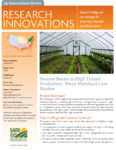
Success Basics in High Tunnel Production: Three Maryland Case Studies
This three-year study involved five innovative farmers in building high tunnels to investigate best practices in high-tunnel construction, tomato production and factors influencing profitability.
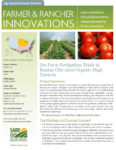
On-Farm Fertigation Trials in Kansas City-Area Organic High Tunnels
Five certified organic farms in the Kansas City area did one-year comparisons of the use of compost, fertigation and foliar feeding on high tunnel tomatoes, with respect to quantity and quality of yields.
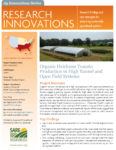
Organic Heirloom Tomato Production in High Tunnel and Open Field Systems
A replicated, systems-level comparison study was carried out to evaluate the production of the popular heirloom tomato, Cherokee Purple, under organically managed high tunnel and open field systems.